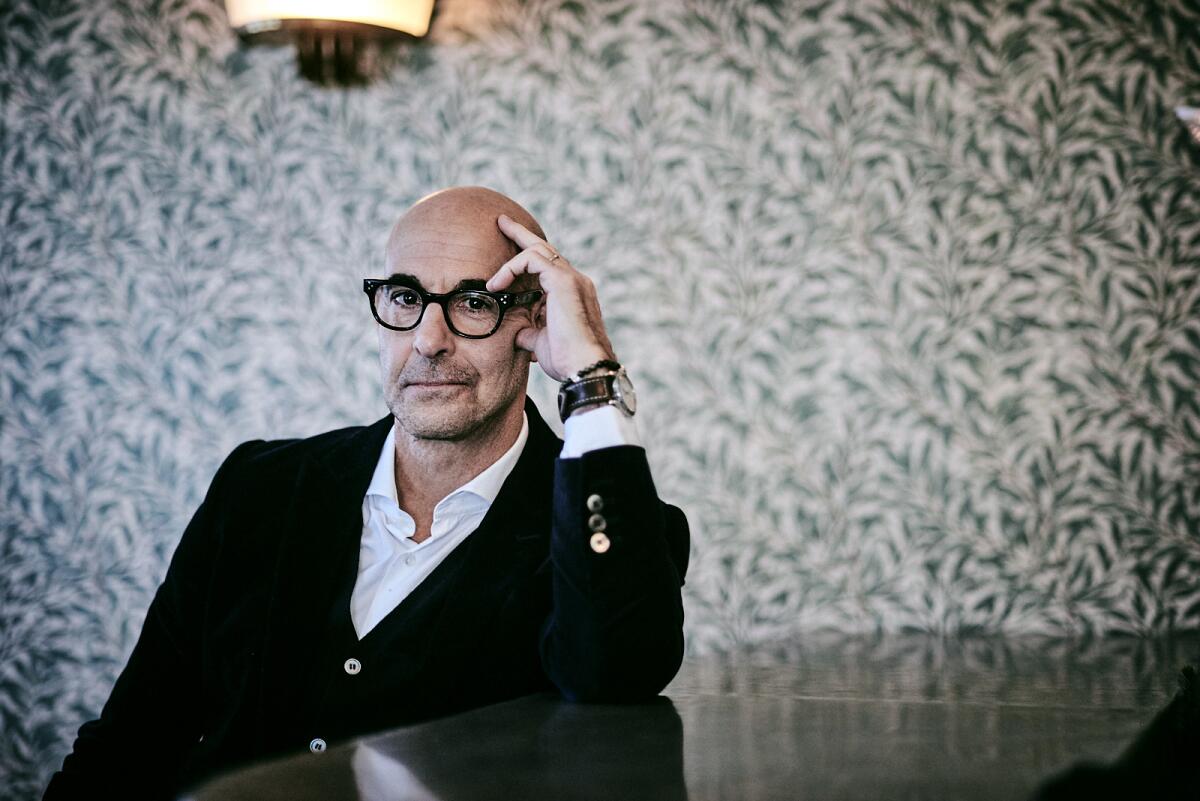Stanley Tucci landed a great role in ‘Supernova.’ Then he swapped it with his costar

Stanley Tucci was originally cast as Sam, a man dealing with his partner’s early onset dementia, in British director Harry Macqueen’s second film, “Supernova.” But by the time the film went into production in the fall of 2019, he had swapped roles with costar Colin Firth.
“We sat down and started talking about the script and where we’d be shooting, and then Colin said, ‘Stanley, I think maybe we should switch roles,’” remembers Tucci, who initially brought the film to Firth after meeting with Macqueen. “I said, ‘I’ve been thinking the same thing.’ And I don’t know why. I just felt it. So we read both ways for Harry — and I could tell Harry was panicked when we told him — and it was evident.”
“It was an amazing process,” Macqueen adds. “They brought that to me, and we decided to do an audition, which is an amazing privilege for a writer-director to have two people like Stanley and Colin sitting in a room reading both roles. I picked five or 10 scenes from the film, and they were kind of brilliant at both roles, as you can imagine. But there was just something about the quintessential Englishness that Colin brought to Sam and a kind gregarious energy that Stanley immediately brought to [the American] Tusker, which made the lighter moments in the film really sing. It just felt right all of a sudden.”
To play Tusker, an American novelist in a long-term relationship with musician Sam, Tucci, alongside Firth and Macqueen, did extensive research on dementia, particularly in people of middle age, and met with doctors at University College London. The film, which was set and shot in England’s Lake District and is set for release late this month from Bleecker Street, explores the tail end of Tusker’s disease, offering a sparse but heartbreaking look at what it means for a degenerative illness to devastate a decades-long relationship. The story unfolds as the couple embark on a final road trip, both grappling with what will happen when it ends. It’s an emotional story, but also one that purposely avoids sentimentality — which is what drew Tucci to it in the first place.
“It’s a very hard movie to make the way Harry made it,” Tucci says. “You can make a movie like that, but they usually end up being melodramatic, or something doesn’t ring true, or the focus gets put on the wrong things. But this? God, I just thought it was beautiful. The simplicity of it. The starkness of it. And I think the contrast between the intimacy of it and the scope of that landscape makes it all the more profound.”
Tucci and Firth have been close friends in real life for 20 years, having first collaborated in 2001’s HBO drama “Conspiracy.” They’ve since been looking for the right project to do together, and their shared history allowed Tusker and Sam’s relationship to feel all the more real.
“There’s a shorthand that you acquire with friends that makes it so much easier,” Tucci says. “When people are in conflict or challenged emotionally with each other, that’s the stuff that, as an actor, in some ways can flow more easily than the lighter stuff. If you’re doing a film, you’ve usually just met the person, and suddenly you have to be their best friend or their lover or their mother or father. And that lightheartedness and depth of shared experience, that’s the hardest thing to get to. Luckily, we had that because we’ve known each other for so long. What came out was easy, whether it was riding in the van and making jokes or lying in bed together.”
“I knew it would be great if we could at least get two people who knew each other enough and got on,” Macqueen agrees. “But what we ended up getting was a pair of actors who love each other dearly and are so, so close. Obviously, Colin and Stanley are nothing like the characters in the film, so you have to reshape and reimagine that love to the nuances of the character and the situation they’re in, but it really does help. There’s a really genuine quality to the depth of their emotional connection.”
Tucci, who says he is a “big believer in playing against emotion,” brings a sense of levity to Tusker’s struggle, but there are moments in the film, particularly toward the end, that hit the viewer like a sledgehammer. It was important to all involved to be as truthful as possible and to maintain the evenhanded, grounded tone in Macqueen’s script (Tucci goes so far as to describe the film as “practically Bergman-esque in its cinematic reserve”).
“It was being truthful to Harry’s script, and it was about restraint,” the actor says. “If we’re just blubbering all over the place, I just don’t think that’s terribly interesting. People have to be pushed to a great point for that to happen, and Harry found those moments where it was supposed to happen.”
In the end, that sense of truth is what makes “Supernova” feel deeply relatable. It’s bittersweet because it feels so real, whether or not you’ve experienced something similar to Sam and Tusker.
“Because it’s so specific to these characters, it raises so many questions, and it’s also incredibly universal,” Tucci says. “It doesn’t matter if it’s a gay couple or a straight couple. It’s all the same. If you love somebody, you love somebody. I like that Harry made it a gay couple. I liked the specificity of that. To me, it makes it more universal.”
More to Read
From the Oscars to the Emmys.
Get the Envelope newsletter for exclusive awards season coverage, behind-the-scenes stories from the Envelope podcast and columnist Glenn Whipp’s must-read analysis.
You may occasionally receive promotional content from the Los Angeles Times.










